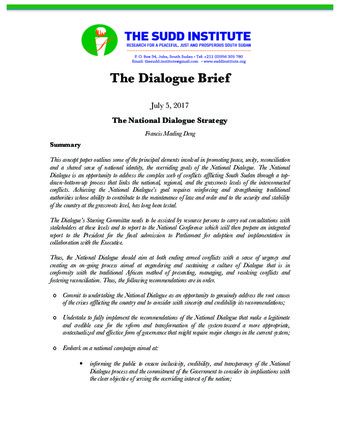The National Dialogue Strategy
Publication Summary
This concept paper outlines some of the principal elements involved in promoting peace, unity, reconciliation and a shared sense of national identity, the overriding goals of the National Dialogue. The National Dialogue is an opportunity to address the complex web of conflicts afflicting South Sudan through a top-down-bottom-up process that links the national, regional, and the grassroots levels of the interconnected conflicts. Achieving the National Dialogue’s goal requires reinforcing and strengthening traditional authorities whose ability to contribute to the maintenance of law and order and to the security and stability of the country at the grassroots level, has long been tested.
The Dialogue’s Steering Committee needs to be assisted by resource persons to carry out consultations with stakeholders at these levels and to report to the National Conference which will then prepare an integrated report to the President for the final submission to Parliament for adoption and implementation in collaboration with the Executive.
Thus, the National Dialogue should aim at both ending armed conflicts with a sense of urgency and creating an on-going process aimed at engendering and sustaining a culture of Dialogue that is in conformity with the traditional African method of preventing, managing, and resolving conflicts and fostering reconciliation. Thus, the following recommendations are in order.
- Commit to undertaking the National Dialogue as an opportunity to genuinely address the root causes of the crises afflicting the country and to consider with sincerity and credibility its recommendations;
- Undertake to fully implement the recommendations of the National Dialogue that make a legitimate and credible case for the reform and transformation of the system toward a more appropriate, contextualized and effective form of governance that might require major changes in the current system;
- Embark on a national campaign aimed at:
- informing the public to ensure inclusivity, credibility, and transparency of the National Dialogue process and the commitment of the Government to consider its implications with the clear objective of serving the overriding interest of the nation;
- challenging communities to serve as agents of the required transformation, by owning the resolutions of the National Dialogue, and assisting in their implementation; and
- identifying creative ways to harness internal resources, as part of a collective responsibility, to rescue their country and set it on a new path of socio-economic recovery and development.
- Engage and impress upon the international community the sincere commitment of the Government to the principles of inclusivity, credibility, and transparency of the National Dialogue process and its determination to give its recommendations serious consideration for credible implementation, and evidencing that commitment through a methodology of outreach, data collection and analysis that engages the public and unlocks their full participation.
Francis Mading Deng's Biography
Francis M. Deng has recently been assigned the position of South Sudan's Roving Ambassador after having been the country's first Permanent Representative to the United Nations. Prior to that, he served for five years as the United Nations Secretary-General's Special Advisor on the Prevention of Genocide at the level of Under-Secretary-General. From 1992 to 2004, he served as Representative of the Secretary-General on Internally Displaced Persons. His first position in the United Nations was that of Human Rights Officer in the Secretariat from 1967 to 1972 when he was appointed Sudan's Ambassador to the Nordic Countries. He was also Sudan's Ambassador to Canada and the United States of America and was also Minister of State for Foreign Affairs for five years. After leaving his Government's service, he held a series of positions in leading think tanks and universities in the United States. Dr. Deng graduated with an LLB (honors) from the University of Khartoum to which he was appointed a member of the Law Faculty and then sent abroad for post-graduate studies. He holds an LLM and a JSD from Yale University Law School. Dr. Deng has authored and edited over thirty books in a wide variety of fields and has written two novels on the crisis of national identity in the Sudan.

